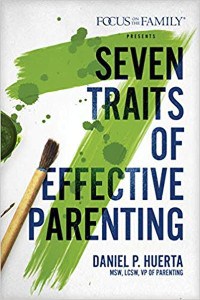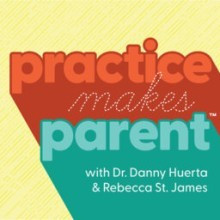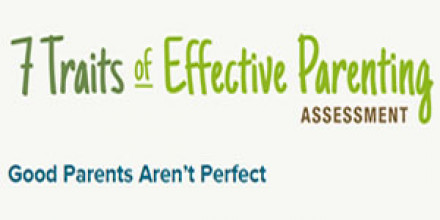Preview:
Dr. Danny Huerta: A lotta lies come through that mirror. I mean, they, they really do. And, uh, something we’ve used is, uh, either chalk markers or dry erase markers. And we’ve drawn a circle in the mirror and then written truths about each other in our home.
End of Preview
John Fuller: That’s Dr. Danny Huerta describing what a mentally healthy family looks like. And the key is, mom and dad, you play an important role in this process of creating a good environment in the home. This is Focus on the Family with Jim Daly. Thanks for joining us. I’m John Fuller.
Jim Daly: Uh, John, mental health is one of those issues that most of us probably don’t think much about, especially if it’s not present or it’s not, uh, extreme. But it is becoming more of an issue in many, many homes, especially here in the U.S. But I’m sure in Canada and other places where we air the broadcast. Maybe you have recognized some problems, especially post COVID. You know, during COVID, I mean, we had the shutdowns and kids were at home not going to school, the lack of socialization. All these things contributed to a real, uh, destabilization of normal activity.
John: Mm-hmm. Yeah.
Jim: And, uh, I know for my boys, it, it was disruptive not to be able to go to school. They didn’t have the prom for two years. It was odd. And I think we’re still experience some of the ripple effect of that. Uh, we do wanna equip you as parents to recognize these things, to bring greater stability in the home, you know. Jesus calls it the shalom. It’s God’s peace. And we as Christians particularly should be experiencing a level of God’s peace. So we wanna try to help as best we can today.
John: Mm-hmm. Yeah. And Danny Huerta is a colleague here at Focus on the Family. Uh, he’s been here a number of years. What, 15 or more years I think.
Danny: 19 years.
John: 19 years.
Jim: 19 years.
John: Wow.
Danny: Yeah, it’s been a while.
John: And, uh, he’s a licensed clinical social worker. He heads up our parenting team here at, uh, the ministry. He speaks, he counsels parents, he, uh, really is all about cultivating healthy-
Jim: Doctor of psychology.
John: Indeed.
Jim: (laughs)
John: All about, uh, cultivating healthy relationships with the family. And he and his wife, Heather, have two kids.
Jim: Danny, welcome.
Danny: Thank you.
Jim: Back.
Danny: Yeah. Thankful for a new day.
Jim: (laughs)
Danny: Thankful to be with you guys in the studio.
Jim: (laughs)
Danny: Yeah. Thank you.
Jim: Well, it’s wonderful. And you’re concentrating every day here at Focus on Parenting. And I so appreciate it that you walk into the door thinking strategically, where does focus need to be with parenting. So thank you for taking that-
Danny: Thankful to be able to do that.
Jim: Some of that…yeah. It’s really cool. Well let’s get started by looking at the research you’ve, uh, looked at about-
Danny: Mm-hmm.
Jim: … mental health concerns for young people today. We touch on this from time to time. And I think just painting the picture is really good.
Danny: Yeah.
Jim: Because it is skyrocketed, the increase of mental health issues in kinda that 15 to 25 year old group.
Danny: Well even, even younger than that.
Jim: Even younger.
Danny: Yeah. Jim, it, it’s fascinating to see what momentums are happening. Right? I’ve seen an increase in social anxiety of kids coming to my private practice with social anxiety and depression. But the statistics show a, a real concerning picture. Six outta 10 boys, teen boys are struggling with loneliness. Seven outta 10 girls are struggling with extreme loneliness. Now, loneliness is not just, “I feel alone.” This is, “I feel lonely and there’s no hope for me.”
Jim: Desperate loneliness.
Danny: Right. It’s a desperate. And then anxiety has gotten much higher in, in, uh, in teen boys. Now it’s one out of every two teen boys is struggling with some form of anxiety. And, uh, six outta 10 girls are struggling with that.
Jim: Mmm.
Danny: And it goes all the way down to suicidal thoughts. Uh, 22% of youth are struggling with suicidal thoughts.
Jim: So, what is going on that is so different now than it was 25 years ago, um, when these numbers were still present, but not as high?
Danny: Well, you- youth are struggling with a variety of different things. And one is social media has created a, a, a just a culture of comparisons, upward comparisons. It’s the what-ifs or what don’t I have type of comparisons. And then the unrealistic comparisons as well. And then we’ve got COVID that created some dynamics that you already mentioned that made it real hard for kids, uh, to, to recalibrate after that. And then, uh, busy families. World view is coming into question. Truth itself. And we know when we remove trust from the human being, uh, experience, you begin to create struggles with mental health. We saw what it created in the Garden.
Jim: Huh.
Danny: In the Garden of Eden.
Jim: Hmm.
Danny: It really… it created chaos in the Garden of Eden. And it does in our, in our culture. And we’re having a, a crisis of trust right now all around us.
Jim: So in that regard when you look at, uh, you know, parents that are listening to this going, “Uh-Oh,”, you know, you begin to self-diagnose what’s going on in your home. Are the kids okay? And you might have some concerns. Obviously, when there’s, uh, extreme mental illness, you need to find help.
Danny: Oh, yeah.
Jim: That’s-
Danny: Absolutely. Yes.
Jim: And, and what’s so hard, Danny, and, and I think it’s a good disclaimer that we have here that sometimes it’s like watching an automobile accident take place in front of you. You’re going, “Did I really just see that?”
Danny: Yeah.
Jim: You know, y- y- you’re not sure of what you’re seeing. So how do you encourage people, parents particularly, to keep an eye on the mental well-being of their children and to notice things that might not be healthy?
Danny: Yeah. Yeah, it, it really requires being attune and attentive, right? Just spending time with your kids. That’s where it begins.
Jim: What are some of those things that, like for anxiety or depression? What, what should you be looking for?
Danny: Well, look for, for major changes. If, if a, a child tends to love, uh, let’s say art and all of a sudden they say, “Yeah, I, I hate it. I don’t wanna do it ever again,” they start to disconnect. They’re saying, “Yeah, I don’t wanna, uh, hang out with friends.” I don’t wanna be with, with people that they’ve traditionally wanted to be a part of, uh, uh, if, if they love to generally be engaged with the family and suddenly they’re not wanting to do that, or their sleep patterns change or eating patterns change. Just if you notice major changes in your child, you begin to see something is not right and I need to start asking questions.
Jim: In that regard, then how do you engage it in a way that’s helpful, not harmful?
Danny: Yeah, you just “Hey, I’ve, I’ve noticed these things.”
Jim: Mm-hmm.
Danny: “And I love you. I care about you. You know I would die for you. And these are some things that I’m concerned about. Uh, I’ve, I’ve noticed that, uh, you’re disconnecting more.”
Jim: Yeah.
Danny: “And, and, uh, just know that this is outta love and, and I’m concerned about what’s underneath the surface.” Behaviors just give us signals and I wanna go deeper than just behaviors.
Jim: Yeah.
Danny: And something’s going on inside.
Jim: You know, a- again, you’re a trained professional. You’re a PhD in psychology. You understand these things. Talk to the poor guy that, you know, doesn’t have that background, that isn’t exposed to those things and he’s just… he’s gotta hunch. Or mom has a hunch that something’s not quite right. How- Where do you go to find additional input to say, okay, here’s what my child’s expressing. Should I be worried?
Danny: Hmm.
Jim: Is there a place?
Danny: Oh, there, yeah. There’s a lot.
Jim: Focus is a place.
Danny: Focus on the Family. Yes. I was gonna say that.
Jim: (laughs)
Danny: So you can go to focusonparenting.com.
Jim: Yeah.
Danny: And, and there, we, we’re trying to equip parents to have those initial conversation starters and also just those signals that they can be aware of. I- With my son recently, we were on a hike and, uh, this just gives you an example of what you can do day to day. We were on a hike and I just said, “Hey, son, have you been, uh, have you been struggling with, with loneliness, with depression? Any anxiety that you’ve been wrestling with in your thoughts.” He said, “No, dad, been, been good.” “What about the insecurities? How are you managing those, ’cause everybody has them? How are they tugging at you?” And, uh, we got into a great discussion about insecurity and what that means, and his fears and the fact that everyone is carrying these things underneath the surface. Some people seem okay on the surface, but you go a little deeper and sometimes you run into other people’s behaviors. And we were talking about that. Whose behaviors do you think you’ve run into that has thrown you off?
Jim: Huh.
Danny: Because you’re having a hard time with how they came at you. What do you think’s going on underneath them that you need to understand rather than react to?
Jim: Yeah, that’s good.
Danny: Yeah.
Jim: I tend to use a lot of scales, like zero to 10.
Danny: Sc- You do.
Jim: I do.
Danny: You do. (laughs)
Jim: I’m a zero to 10 guy.
Danny: You’re a scale guy.
Jim: So I’ll say that to the boys. I’ll, you know, with anxiety or something, “Where you at on a scale of one to 10?” You know.
Danny: That’s good. Yeah.
Jim: Two or eight, whatever it might be. And then it gives you a little indication. It’s almost like a dash light on your car, right?
Danny: That’s super.
Jim: If it’s an eight, that’s a red light. You gotta engage and figure out what’s going on. If it’s a two, that’s good. That’s- you’re able to manage these things. So, you, uh, and a lot of what we’re talking about is based off of content in your book, Seven Traits of Effective Parenting. Uh, and y- y- you have mentioned a story where you and your wife were struggling.
Danny: Hmm.
Jim: I so appreciate the vulnerability of that. (laughs) We all have those moments, don’t we John?
John: We do, yes. (laughs)
Danny: It’s good to have those moments.
Jim: Yes. I love- Jean one time said, “I love you. I don’t like you right now.”
Danny: Mmm.
Jim: Of course, my response is, “How could you not like me?” (laughs)
Danny: (laughs)
Jim: Not, not probably the best, best response.
Danny: That’s good.
Jim: But, uh, you know, maybe I should look a little deeper into my issues. But the, the point of that is I appreciated that vulnerability. But what, what was the moment? And then your son, who was pretty young at the time, had a solution for you, which was pretty amazing.
Danny: He was four, and God spoke directly through him. This was a momentum shift of my soul that I needed. And I love telling the story, it makes me emotional sometimes, so we’ll see where it goes, Jim.
Jim: (laughs)
Danny: Uh, but I was sitting around the kitchen table with my son. Uh, it was a round, round table. Uh, we had been experiencing stress in the home. I really consider that a dry time spiritually for me. I was a therapist, I was doing all the things externally. But inside-
Jim: You’re pouring out a lot and not refilling.
Danny: I was pouring… correct. And, uh, my son was playing with one of those plastic construction sets. I’m sure you guys are familiar with that.
Jim: Yeah.
Danny: And then had the plastic screwdriver. He looked at me with those just innocent 4 year old eyes and then got up from the table, starting walking around the table and he said, “Daddy broken, need fixed.” And he put the screwdriver right on my side.
Jim: Mmm.
Danny: And I started to weep. He probably thought, “Man, I just poked my dad and he’s leaking.”
Jim: (laughs)
Danny: (laughs) He’s leaking. And, uh, it was a moment where I knew God was speaking to me.
Jim: Wow.
Danny: And it was truly a monumental momentum shift in my soul to pursue him whole-heartedly because I felt him pursuing me through my son.
Jim: Yeah.
Danny: He knew I would listen.
Jim: Yeah. Got your attention.
Danny: He got my attention.
Jim: That’s half or even more than half the battle-
Danny: Yeah.
Jim: … that we recognize where we’re falling down.
Danny: Right.
Jim: In that regard, uh, you believe, and I totally agree with you, that mental well-being is built on a strong spiritual foundation. Um, what are some of those essential spiritual rhythms that parents should put into the home? Jean was great at this. I mean, moms are typically really good at this.
Danny: Yeah.
Jim: But what should we be thinking about in terms of those rhythms?
Danny: You’re, you’re absolutely right. The, the foundations require rhythms. And it’s, the first one it begins with prayer. Prayer is foundational. Do you actually believe that when you’re praying you’re speaking to the, to the creator of the universe? Uh, do you, do you model that in your home? So first rhythm is prayer. The second one is reading God’s word together as a family on a regular basis. Engaging with God’s word, whether it’s one verse or, or a whole chapter in, in the Bible.
Jim: Mmm.
Danny: Uh, and then, the, the next one is rest and balance. Do you model the idea of rest and balance? Which includes exercise and pausing life and spending time together. And then the other one is talking about what does it mean to have an identity as a child of Christ? What does that mean? And talking about that over and over again, because we lose sight of our identity as a child of God. And everything, when we see things through that lens, things change, the way we see things. And the way we thirst for things in our lives. This is a sense of belonging, worth all that changes when we’re a child of God because God says, “I’ll take care of you. Don’t worry about that.”
Jim: Mmm.
Danny: And then the last one is to cultivate, uh, humility in your home. Always be talking and valuing what it means to have a humble heart. And when you see the evidence of that and say Hey, look at that. Do you guys notice that? Because we notice all the pridefulness. And many times we’re drawn to that. And to dr- we’re, we’re naturally drawn as human beings to very confident and maybe overly confident people. And we look at social media, it heightens that.
Jim: Hmm.
Danny: But notice the humble, the make. And as a family if you notice that, if you have that kinda culture, it really fosters a teachable heart.
Jim: Yeah. Another thing that you did that I, I connected with was journaling. I didn’t lay that as an expectation out for the boys, but I did it for them. They’ve got, you know, when I would travel internationally, uh, early with Trent when he was born, I kept, like, a 400 page journal and just wrote on these long trips to wherever. But I would talk family history, I’d draw diagrams of where I was going, to South Africa or Russia or China or wherever I was headed. And, you know, first baseball tickets and photos that meant a lot to me. I put them all in the journal. They’ve got them now. I mean, they’ve got them in their time capsule boxes that Jean and I created. And Trent said he reads it almost every night.
Danny: That’s great.
Jim: And, you know, just talks about the importance of faith and what our family’s gone through and, you know, what God can do for you if you trust Him and those kinds of things. But how did you do the journaling as a family?
Danny: So I did that and I think I, I, around three years of age for each of the kids I kinda, you know, the busyness.
Jim: Yeah.
Danny: (laughs). The busyness was gone. But it, the, a different kinda journal was one where we put journals at each of our spots at the kitchen table. It wasn’t one we wrote in. So the one that was at my spot, my family would write in to, to give me life giving words.
Jim: Wow.
Danny: And then my daughter had one. My son, my, my wife. And, uh, we would just write either quotes, verses, or words that we felt God was speaking through me to you. And, uh, we would put those at the, at the table and, and reference them. Here’s one. I’m gonna read one. Before a trip for Focus on the Family I went to speak, um, at a conference, a home school convention. And right before, uh, I, I got on stage I read this note from my daughter that she had written. I took it off the table and I said, “I’m taking it with me.” And it said, “Dad, you can have knowledge and you can be meticulous in your preparation, but without the direction of the Holy Spirit, you’ll have no power and your talks will, will not be effective. Make sure you rely on the Holy Spirit. He will give you strength.”
Jim: Wow.
Danny: Oh my goodness.
Jim: That’s your daughter?
Danny: So I was gone-
Jim: (laughs)
Danny: … and she was, she was a young teen at the time.
Jim: Yeah.
Danny: And I said, “Oh my goodness. Thank you for the reminder.”
Jim: Yeah.
Danny: And in that moment I said, “Yes, Holy Spirit, this is yours.”
Jim: Sounds like the author of Proverbs.
Danny: Yeah, that’s right (laughs)
Jim: (laughs)
Danny: And so those are the quotes. The things that she finds or that my wife will find and will put it in, um, uh, at our spot. And one time my son said, “Dad, I think I’m done with the journal thing. I think I’m good.” And just the other day at 19 he still, uh, living at home, uh, saving some money, doing that. And he said, “Dad, I love that journal thing again.”
Jim: (laughs). Awe.
Danny: I think that reassurance as an adult, right?
Jim: That’s great. Have them thirst for it.
Danny: Yes.
Jim: That’s good.
Danny: Yeah.
John: Rhythm of encouragement there. Well, that’s Dr. Danny Huerta. He’s, uh, our guest today on Focus on the Family. And as Jim said earlier, sharing a number of great ideas, uh, as captured in his book, Seven Traits of Effective Parenting. Uh, we have copies of that here at the ministry. Call us to get yours. Our number is 800, the letter A and the word FAMILY. Or stop by focusonthefamily.com/broadcast for all the details.
Jim: Danny, you use something called thought bubbles and you talk about that in your book. What w- w- w- what is the age appropriate use of thought bubbles? And what are thought bubbles?
Danny: (laughs) Yeah, I love this-
Jim: I didn’t think I could get those all out.
Danny: Thought bubbles.
Jim: Thought bubble, thought bubble.
Danny: Uh, really I have families, uh, talk with each other about different thoughts that we can have. And so they’ll have a blank sheet of paper. And as young as three, four, five you can begin to fill out those thought bubbles.
Jim: Mmm.
Danny: And then talk about the potential choices. Why- what made you choose that different thought bubble? And could you reach for the better thought bubble?
Jim: What’s an example of that?
Danny: So let’s say, uh, a child is wanting candy. Let’s just say that.
Jim: Let’s just say that.
Danny: Let’s just say that. And, uh, there was a boundary put not, don’t, don’t have candy. And what you can do is, is put this… write the boundary down. It was, don’t have candy. And say, “What all… what kinds of thoughts did you have?” Well, I want the candy. I’m not supposed to have the candy. I could get in trouble if I grab the candy. Uh, boy, I really f- I, I would love to have some sugar right now. All these different thoughts.
Jim: Candy good.
Danny: (laughs) Candy good. That’s right.
Jim: (laughs)
Danny: And you write them down so they can see it. Multiple thoughts come in. How did I choose the one that I did?
Jim: Hmm.
Danny: Was it an emotion that caused that? Was it because it was a selfish reason that I chose that thought bubble?
Jim: So what, what are you driving at in that example?
Danny: It’s to-
Jim: What, what do you hope to prove as a parenting point?
Danny: It’s to reach for the better thought bubble.
Jim: Okay.
Danny: And, and so watch themselves actually reaching for that harder or better thought bubble-
Jim: Yeah.
Danny: … with the value of relationship.
Jim: Yeah.
Danny: And, uh, noticing that thoughts, you don’t have to just follow them.
Jim: Yeah.
Danny: You have a choice.
Jim: Another thing you use is a feelings chart.
Danny: Yeah.
Jim: Talk about the importance of that. It does make it far easier. I remember one time I had, uh, disciplined Trent for something and he was non-communicative, you know. I’d say, “Can you talk to me?” And he’d shake his head no. And so I went and got a feeling chart. How do you feel right now? Angry. (laughs)
Danny: (laughs)
Jim: So, that’s good.
Danny: That’s good. Yeah. That’s a good start.
Jim: You’re get- you’re getting the thought out there.
Danny: Yeah. Right.
Jim: So, how do you use… why use it and, and how to use it effectively?
Danny: It helps you teach your kids that, that emotions are simply signals, right? There, uh, there’s a lot of information to be found through emotions. You don’t have to take them for a ride. They’re not necessarily bad. They’re just following some thoughts.
Jim: Yeah.
Danny: It gives you signals to go a little deeper. And something we created is a, a feelings chart that is actually a water bottle sticker.
Jim: (laughs)
Danny: And so the analogy with that is that we thirst for things. And sometimes those thirsts create a certain emotion inside of us, uh, and can throw us way off. And so asking your kids, “Hey, what, what do you think you’re thirsty for? Is it acceptance? Is it that you don’t, you don’t feel accepted and so that makes you feel sad? And may- maybe it makes you feel angry?” And so you go backwards to the real thing. “I feel left out.” I know with, with my daughter, I actually apologized to my kids early on. I said, “Guys, with anger or happiness or sad, I’m gonna go deeper. And, and I, you know, your, your dad’s a counselor.”
Jim: Your dad’s a counselor.
Danny: (laughs) Right. I’m a counselor.
Jim: Bummer of a birth order here.
Danny: (laughs)
Jim: (laughs)
Danny: So we’re gonna be, (laughs) we’re gonna be going deeper.
Jim: (laughs)
Danny: So we’re not gonna stop there.
Jim: That’s good.
Danny: As parents, there’s no… e- e- emotions are gold for you. They’re opportunities to get to know your child even deeper. And talk about your own emotions. If you feel upset, you go “Man, I feel upset.” But below that is this emotion. And below that is this. I feel unheard. I feel, uh, dismissed.
Jim: Unloved.
Danny: Unloved. Those words that are much more descriptive and much more helpful to be known are the ones that you want to put out on the table instead of the surface ones. Help your kids understand that the deeper you go, the more they’ll be known and we thirst for that.
Jim: Yeah.
Danny: We do want to be known by people.
Jim: You know, and again, I, I haven’t met a parent who doesn’t want to be thinking about those things and do the right thing. Sometimes it’s just the knowledge or the intentionality again to be that engaged and t- and I think, you know, we tend to be people who take the l- the path of least resistance, right. So you get home, you plop on the news, you sit in the chair. I just need, uh, 20- give me 20 minutes just to get ready-
Danny: (laughs)
Jim: … for the chaos (laughs). And, and then you never get outta the chair.
Danny: (laughs) Right.
Jim: It’s… and so, speak to that parent what they’re missing out on if they don’t… there’s so much excitement, enthusiasm, learning when you do engage in this way. But it takes effort.
Danny: It does. It does. It takes effort. It takes energy. I mean, conversation is something that you have to be right there in.
Jim: Yeah.
Danny: You have to be involved. It takes a lot of concentration on your part to involve that.
Jim: W- what a great reward, though. The relationship that you’re gonna have.
Danny: Oh, yes. Yes.
Jim: You know, somebody was telling me the other day, uh, that, uh, he was the officiator at his daughter’s wedding. You know, that’s pretty tough. And then she leaned to him and said, “Dad, you’re always gonna be my best friend.”
Danny: Awe.
Jim: And he said he started to cry.
Danny: Yeah. Melt. Ah.
Jim: But the point of mentioning that is that’s the relationship you want with your child.
Danny: That’s right.
Jim: Especially your adult child.
Danny: Yeah. And it goes so fast, Jim.
Jim: Ah.
Danny: And many times you think, ah, we’ll just, we’ll just do that tomorrow or next week. And pretty soon it’s years that have gone by. And, uh, just, you can start off with a walk. If you get up and start walking and just go side by side, you’ll see the conversation will come over time. Maybe the first one will be very quiet, and that’s okay. And, and over time you’ll, you’ll enjoy those conversations.
Jim: We’re right at the end, Danny. I do wanna mention something, uh, that you refer to in the book which is, who gets a vote.
Danny: Yeah.
Jim: ‘Cause I think the concept is excellent. Describe who gets a vote and how do you apply that in your, in your family.
Danny: Yeah, I still remember a, a young man came to my office, and he said, “Mr. Huerta, I’m too short to ever get married.” I said, “Wait, how’d you get that?”
Jim: (laughs)
Danny: And he said, “Well, somebody told me I was too short.” I said, “Well, how did they get to vote on that? I mean-”
Jim: Right.
Danny: … “I’ve seen short people get married. So that’s not even true.” (laughs)
Jim: (laughs) Right.
Danny: Right. So how did they come up with that? And that just gives you a concept that some people have more power in what they say than others. And it may be healthy power and it may be unhealthy. And so the idea of the concept is that you, you draw concentric circles. And the middle circle are the people that have the most powerful votes, the most votes in saying who you are. And for kids, it may be the most popular kid, it may be a toxic kid, a, a kid they wanna be like, or be like bye. And they’re in the middle circle. And you have to figure out, what does that mean? If they’re getting that many votes, what does that mean in how you see yourself when you look in the mirror?
Jim: Mmm.
Danny: And then you, you look at the outer circle, the, the, as, as you go out in the concentric circles and sometimes parents find themselves there. And you can see, I don’t get as many votes. So if I say something positive to my child and something said negative by this other person, they’re believing more of that. So ask your kids, as you’re filling that out, what does this mean? Do you want these people to have that many votes? And if you don’t, and they’re affecting you, how can we move them to a different place on your vote chart and really getting the right people in the middle, so you get an accurate perspective of who you are. Adults when they do this it’s pretty powerful.
Jim: Yeah.
Danny: When they start filling out who gets, who gets the most votes. And a lotta times it’s those emotions that throw you off. It’s an insecurity or thirst to belong or to feel a sense of competence. Somebody that you thought can measure you on that all of a sudden gets these votes, then it throws you off in, uh, having the write in the healthy people that can accurately give you the thirst for Christ in that middle vote.
Jim: I like that. Yeah. No vote for you.
Danny: Yeah. No vote for you, that’s right. (laughs)
Jim: (laughs) I do like that. Let’s end right here. Uh, you know, I’m thinking back when I was 13 and you’re that, or your freshman year in high school, even better. And you’re looking in the mirror going, “Man, I’m not as muscular as that junior I know from PE class who almost beat me up the other day.” Or “Look at that zit. Where did that zit come from?” There just are a lot of imperfections that are showing up in that, that early teen experience. H- how can you encourage your son or daughter, and I’m only… those examples were obviously boyish.
Danny: Yeah.
Jim: But in that regard, what can you do as a parent to encourage your, your pre-teen, teen to not just look in the mirror?
Danny: Hmm. Well, a lotta lies comes through that mirror, right?
Jim: (laughs) They do.
Danny: I mean, they, they really do. And, uh, something we’ve used is, uh, either chalk markers or dry erase markers. And we’ve drawn a circle in the mirror and then written truths about each other in our home. I remember doing it for the first time for my son and my daughter-
Jim: Mmm.
Danny: … where I, I drew a circle, they were sleeping. Drew a circle, uh, for my son and a heart for my daughter. Right? And, uh, where they were gonna see themselves in the mirror. And then I, I put arrows on there. And I s- I called my wife over, “Hey, let’s put things that are true about them specifically, not general.” Man, it, it really requires-
Jim: Yeah.
Danny: … a lot of thought.
Jim: Yeah.
Danny: To sit there. I was going, man, this is harder than I really expected. I was writing those out and they saw them and they, they ran over, and they said, “Hey, thank you.” It meant a lot to them. And then they did, uh, they, uh, drew some circles on our mirror the next day.
Jim: Oh, wow.
Danny: And so then we had fun. My wife said, “Well, this is gonna be fun to clean up.” But, but it was-
Jim: (laughs)
Danny: … It, it’s been fun to use and surprise each other with these, these markers to… so that our children will have the truths in the mirror, and they’ll remember those words instead of the, the deficits that they tend to wrestle with in the mirror.
Jim: And again, this is for the mental well-being of our children and making sure they’re feeling strengthened and encouraged and defended. And I, I just love the concept, so.
Danny: And Jim, on, on that, bringing them back to what scripture has said about who they are.
Jim: Yeah, most importantly.
Danny: Right? Masterpieces of God’s creation, Ephesians 2:10.
Jim: Made in His image.
Danny: Yeah, made in His image. Psalm 1:39, Fearfully and wonderfully made. So much in scripture gives us the reassurance and the picture of truly who God sees us to be.
Jim: Yean.
Danny: And we often forget that. And one of the big words that I wanna leave, uh, parents with is the word trust. How are you really cultivating trust in your home?
Jim: Yeah.
Danny: Trust in God, trust in each other. That is core. When you lose trust, things start to get wobbly.
Jim: Yeah.
Danny: And so if you wanna start somewhere, start with the word trust. What’s happening there.
Jim: It’s so good. Danny, pleasure to be with you today on the program. And thanks for doing everything you do to walk in every day thinking about the job of a parent.
Danny: Mm-hmm. Thank you.
Jim: And, uh, man, we are chock full of resources here at Focus on the Family. I think, you know, I’ve been here, um-
John: A long time.
Jim: Shocked to say, I think 34 years.
John: Wow.
Jim: I started at Focus in 1989.
John: Wow.
Jim: And, uh, you know, when you think about it, Dr. Dobson and the team over the years, I mean, just simply built a resource center for marriage and parenting.
John: Mm-hmm.
Jim: And, uh, we want you to tap us for help. That’s the whole thing. If you don’t feel like your parenting technique is, uh, moving in the right direction, let us help you. Just give us a call. You can talk to a counselor. We’ll send you resources. We’ll give you ideas. And if you’re dealing even with some more serious things, uh, we’re here to help you. And that’s the critical thing to remember. Uh, Danny’s got a great book, Seven Traits of Effective Parenting. That’s a tool you can put in your resource chest, uh, to go to. And you can get a copy when you contact us here at Focus on the Family.
John: Yeah. This is a terrific book. It’s got lots of great charts, uh, a lot of interaction for you as a parent. Uh, get a copy today of Seven Traits of Effective Parenting when you call 800, the letter A, and the word FAMILY. Or stop by focusonthefamily.com/broadcast. And when you make a gift of any amount to Focus, we’ll send you a copy of Danny’s book as our way of saying thank you for being a part of our support team. Uh, plus, at our website, we’ve got details about our new podcast. It’s called Practice Makes Parent. It features Dr. Danny Huerta and Rebecca St. James, and the podcast really has a lot of great practical insights and faith based encouragement. Uh, real life strategies for every stage of parenthood. Check out Practice Makes Parent today. And again, you can donate and get your copy of the book, Seven Traits of Effective Parenting and so much more at focusonthefamily.com/broadcast.
Jim: Danny, great to have you with us. Thanks for being here.
Danny: Thank you.
John: Well, coming up tomorrow, Dr. Kevin Leman wants to help you experience a happy, lifelong marriage.
Preview:
Dr. Kevin Leman: And here -here’s what I want people really understand. When you share feelings, it draws you together. When you go down the judgment trail, now the defenses go up.
End of Preview





















